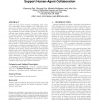32 search results - page 3 / 7 » Expectations driven approach for Situated, Goal-directed Age... |
AAMAS
2000
Springer
13 years 4 months ago
2000
Springer
We adopt the decision-theoretic principle of expected utility maximization as a paradigm for designing autonomous rational agents, and present a framework that uses this paradigm t...
ATAL
2005
Springer
13 years 10 months ago
2005
Springer
There has been much research investigating team cognition, naturalistic decision making, and collaborative technology as it relates to real world, complex domains of practice. How...
AGENTS
2001
Springer
13 years 9 months ago
2001
Springer
Agents are intended to interact in open systems where the knowledge about others (reputation) is incomplete and uncertain. Also, this knowledge about other agents is subjective si...
SERA
2010
Springer
13 years 3 months ago
2010
Springer
—Information systems are expected to satisfy increasingly ambitious requirements, while reducing time–to–market has become a primary objective. This trend has necessitated th...
ECAI
2006
Springer
13 years 8 months ago
2006
Springer
Being able to ensure that a multiagent system will not generate undesirable behaviors is essential within the context of critical applications (embedded systems or real-time system...

